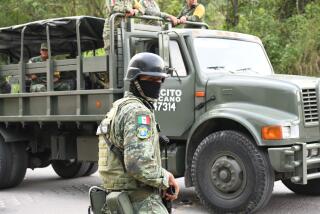Death toll rises in Rio violence
- Share via
SAO PAULO, BRAZIL, AND BOGOTA, COLOMBIA — Rio de Janeiro police on Wednesday announced seven more deaths and 17 arrests as drug-fueled violence continued to sweep over parts of the city that this month was named to host the 2016 Olympics.
The death toll has risen to 33 since Saturday, when rival gangs launched a turf war for control of drug trafficking in several favelas, or shantytowns, interspersed among Rio’s luxury hotels and residential areas.
Gangs are suspected of using high-caliber weapons to shoot down a helicopter on Saturday near the Morro dos Macacos slum, which remains the scene of fighting between rival gangs and police trying to subdue them. Three of six police officers on board were killed in the crash.
Most of the dead this week were suspected gang members, but the victims also included several bystanders. On Wednesday, 18-year-old student Jose Carlos Guimaraes was seriously wounded in the abdomen by a stray bullet during a confrontation between police and criminals at the Vila Cruzeiro favela.
Hundreds of Rio de Janeiro state police have been deployed in a bid to control the violence. Gov. Sergio Cabral has requested additional forces from the federal government.
The pressure is on local authorities to quell the violence as Rio begins its $14-billion preparations to host the Olympics in 2016, the first time the Games will be held in South America. Mayor Eduardo Paes is on a foreign trip to generate investment in the effort.
In awarding the Games to Rio instead of Chicago, Tokyo or Madrid, the International Olympic Committee made a leap of faith that Rio authorities would bring the city’s sometimes horrendous crime under control.
Many of the 2014 World Cup soccer matches will also be held in Rio.
The turf war started Saturday when the Red Commandos gang mounted a predawn invasion of Morro dos Macacos, controlled by the Friends of Friends gang.
Police recently increased their presence in five favelas, forcing gangs to fight over other areas.
On Wednesday, police said that among the 17 arrested was Rodrigo Mello, a leader of the Red Commandos. Mello is said to have ordered the invasion of Morro dos Macacos, the biggest favela not under his gang’s control.
Ten buses have been burned since Saturday, a form of gang retaliation, and some bus lines have suspended service to the favelas.
Several Brazilian newspapers on Wednesday published a photo of the corpse of a suspected gang member found in a shopping cart.
In an interview with Folha de Sao Paulo newspaper, Ricardo Teixeira, head of the Brazilian Soccer Confederation and co-organizer of the 2014 World Cup, tried to minimize the negative impact of the violence.
“There was a natural reaction, the same way as when we turn the TV on and see the attacks of crazy kids in the United States killing everyone and shooting everyone,” he said, referring to cases of school violence.
But Antonio Biscaia, who ran for Rio state governor in 2006 against Cabral, said the city lives in a kind of civil war, alleging that slayings are rising in Rio while declining in the rest of Brazil.
“Some administrations don’t want to face the problem because their popularity can get soiled in these areas, with voters from poor communities,” Biscaia said in a magazine interview.
--
Soares and Kraul are special correspondents.
More to Read
Sign up for Essential California
The most important California stories and recommendations in your inbox every morning.
You may occasionally receive promotional content from the Los Angeles Times.













